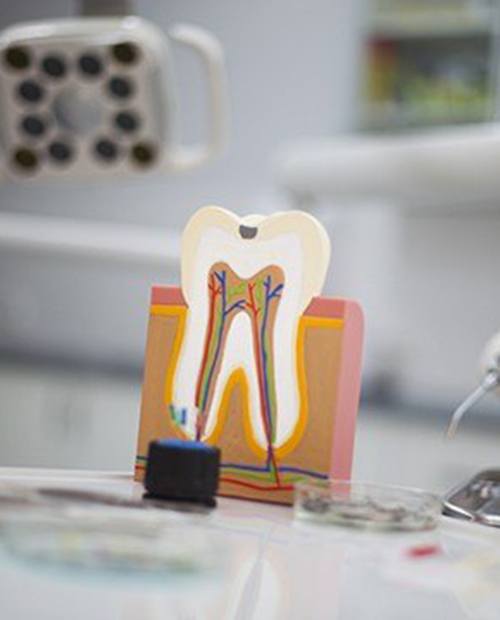Root Canal Therapy – Billerica, MA
Alleviating Pain While Saving Your Smile

Are you experiencing severe tooth pain that resides inside the structure? Does it hurt to eat or drink anything hot or cold? If so, you may be dealing with an infection or damage to the innermost layer of your tooth – the pulp. When this happens, immense pain tends to be the result, and the only viable way to get rid of it is to undergo root canal therapy. At Grateful Dentists, our team of professionals is here to deliver compassionate, personalized care using advanced technologies and techniques to ensure a successful, long-lasting result. If you want to avoid tooth extraction and worsening symptoms, call our office to schedule an appointment.
Why Choose Grateful Dentists for Root Canal Therapy?
- Dental Insurance Welcome
- We See Patients on Weekends
- CEREC Same-Day Crowns Available
Do I Need Root Canal Therapy?

The only way to know for sure that you need root canal therapy is to see a member of our dental team for an appointment. It is during this visit that we will take diagnostic images of your smile as well as perform a visual examination. However, before all of this, you may experience certain symptoms that lead you to see a dentist. These might include:
- Prominent tooth pain in your face, bone, jaw, or teeth
- Tooth sensitivity
- Feeling that the tooth is loose
- Cracked or chipped tooth
- Difficulty eating
- Inflamed gums
- Discoloration of the tooth
The Root Canal Process

When undergoing a root canal, it is important that you understand the process so that you are fully prepared. The steps your emergency dentist in Billerica will take include:
- Isolating the tooth with a dental dam
- Administering local anesthesia to ensure you remain pain-free throughout the procedure
- Making a small opening in the crown of the tooth, exposing the inner structure
- Clearing out the nearby canals and removing the infected or damaged pulp
- Filling the tooth with a malleable substance known as gutta percha
- Sealing the tooth to prevent further reinfection or damage
- Taking impressions of the tooth so that a customized dental crown is created
- Placing the complete crown over the vulnerable structure to ensure that it is properly protected and able to strengthen over time
The Benefits of Getting a Root Canal

Root canals might seem like scary procedures, but they are one of the most beneficial procedures you can receive, especially if you want to avoid an extraction. You’ll find that by opting to move forward with this type of treatment, you will enjoy immense benefits, such as:
- The removal of pain caused by the infected or damaged pulp
- A cost-effective solution that allows you to avoid the high expense of tooth extraction and replacement
- Keeping your natural tooth structure instead of removing it
- A natural-looking restoration that is created in-house with our milling unit
- The high success rate that puts your mind at ease about the future of your smile
Understanding the Cost of Root Canals

When it comes to the cost of your root canal, there are a few different things that need to be taken into consideration. To determine the exact cost of your treatment, we will need to closely examine your smile. In the meantime, here are some of the things that you may want to think about regarding the cost of root canal therapy.
Factors That Can Affect Root Canal Cost

It is difficult to determine the exact cost of a root canal until our team has had the opportunity to assess the tooth or teeth in question. There are several different factors that can influence the final amount. Here are the main ones:
- Location: Depending on where your missing tooth is located, the cost will vary. Molars tend to cost more than front teeth to treat because they have more roots.
- Difficulty: When a root canal is more challenging, it ends up costing more.
- Additional Treatments: If you need another service, like a dental crown, this will contribute to the cost.
Is it Cheaper to Pull My Tooth?

It is common for patients to want to skip over the root canal process and have their tooth pulled instead. While extractions tend to be more affordable upfront, it’s important to consider the long-term costs. For example, your bite could be negatively affected by surrounding teeth shifting out of place. This would require additional treatments. To prevent this, it would be recommended that you get a dental bridge or implant. By saving your tooth with a root canal, you can avoid this issue as well as many more, including bone loss!
Does Dental Insurance Cover Root Canals?

Root canal therapy is considered to be a major procedure, and it is very common for dental insurance plans to cover anywhere from 50% to 80% of the cost after the deductible has been met. However, every plan is different. This is why it is important to confirm this with your insurance company first. Our team is also happy to help with this process!
Other Options for Making Root Canal Therapy Affordable

If you don’t have dental insurance, this doesn’t necessarily mean that you will be left completely on your own. With the Grateful Dentists Loyalty Program, you can save 13% on all services completed at our practice. We also work with CareCredit – a third-party financing company that can split the cost of your treatment into manageable monthly installments with little to no interest. For more information on your financial options, don’t hesitate to reach out to one of our friendly team members.
Root Canal FAQs
How Long Does it Take to Recover From a Root Canal?
Every patient’s recovery time will be different, but the majority of people are typically able to get back to work or their daily routine the day following their procedure. Of course, you’ll need to refrain from strenuous or physical activities for several days. Too much exercise can end up diverting blood from the surgical site and interrupting your recovery. It’s normal for your mouth to feel sore for a few days, but you can manage this with pain relievers. Stick with soft foods that don’t require chewing, and be gentle around your tooth when brushing and flossing. Notify our team if you notice any discomfort that persists after three days or worsens so that we can help resolve the issue.
What Should I Do Before a Root Canal?
Be sure to enjoy a healthy meal before undergoing your treatment. Avoid alcohol as well as tobacco products, as these can interfere with any numbing agents to keep you pain-free during your procedure. In some cases, you might be recommended to take over-the-counter pain medication, such as ibuprofen, before your appointment to help minimize discomfort whenever the numbness fades away. Make sure to also get plenty of rest before and after your root canal. Doing so can both help you feel less anxious and promote a more efficient immune system for a faster healing process.
What Happens If You Wait Too Long for a Root Canal?
Teeth are the only parts of your body that won’t regenerate on their own. Tooth infections can only get worse unless you receive root canal treatment. The best way to save your smile is by undergoing the process after your dentist recommends it. Your tooth can potentially stop hurting after a while, but this doesn’t mean the underlying problem has vanished. This can simply mean that the nerves have been too damaged that they can’t register pain anymore. If you wait too long for a root canal, the infection can end up spreading throughout your gums, other teeth, jaw, and even the rest of your body. You may end up needing to extract the tooth, which can come with more costly treatments later on.
Are Root Canals Painful?
This procedure may have been very uncomfortable in the past, but with modern dental technology and techniques, you can expect the process to feel similar to filling a large cavity. This treatment is also designed to alleviate discomfort by getting rid of the infection in the tooth, meaning it’s designed to relieve pain. Of course, like with most dental procedures, our team will numb your mouth with a local anesthetic so that you’re pain-free during your visit. Your tooth and mouth may feel sore and sensitive for a few days afterward, but any discomfort should begin to go away after two to three days. Simply take over-the-counter pain medication and use a cold compress to minimize discomfort. If you notice any pain worsening or persisting after a few days, let our team know so that we can help.



